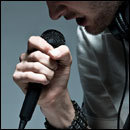3 Celebrities You Idolize (And The 3 You Resemble Instead)
A lot of us don't measure up to our idols. Like the little league ballplayers who dream of being Derek Jeter but grow up to be high school gym teachers. Or the young mall-rat divas aspiring to be Christina Aguilera who end up performing on Carnival cruise lines. But what about people who are distinct successes, but still want to be some wholly othe

A lot of us don't measure up to our idols. Like the little league ballplayers who dream of being Derek Jeter but grow up to be high school gym teachers. Or the young mall-rat divas aspiring to be Christina Aguilera who end up performing on Carnival cruise lines. But what about people who are distinct successes, but still want to be some wholly other thing? In the early '80s, Eddie Murphy apparently wasn't content being the world's most popular comedian and movie star, so he decided to become Rick James for awhile.

Far more damning than that story about him and the transsexual. Or how about Billy Bob Thornton, who must have been so unfulfilled as a mere respected actor and Oscar-winning screenwriter that he tried to become some latter day, country rock Warren Zevon. Thornton yearned for that identity so badly he freaked out
Music: The Flashy Cosmic Rocker vs. The Earnest Singer-Songwriter


"Oh my God! He's SUCH a gaylord!" Yep. I was shocked. Why was he standing like that? Didn't he know that looks gay? But Ziggy Stardust

The early '80s Bowie was still unique and stylish, but less likely to get chased by guys with baseball bats after a concert in Boston. David Bowie was everything I wanted to be: eloquent, daring, multifaceted, stylish and impossibly cool. So yeah, I dressed up like Bowie, and played in bands, and always aspired for diversity, but in every single musical thing I ever did, I felt something pulling me back down to a more familiar place. A place called ...The Reality: Billy Joel

Not fair to blame Billy for the mullet. In fact, my first time performing on stage, I sang Billy Joel's "Only the Good Die Young" while wearing a T-shirt and a sports jacket at my high school Battle of the Bands. (An outfit I'm apparently still rocking
Monsters: Vampire vs. Werewolf


Maybe not as respected as Interview With the Vampire, but easier to finish.

Just for clarity, I didn't aspire to be this kind of vampire, who looks like the spawn of gremlins and sea monkeys. I'm talking about these vampires:


Yep, you guessed it. Werewolves are fastidious with their personal hygiene. Yeah, the body hair. Perfect for a wolf, but not so great for a vampire.

Apparently, the thirst for blood is borne from inadequate testosterone levels. And whereas popular movies like The Hunger

My hands don't look like that, but when I was 13 I heard they might start to unless I stopped doing a certain thing.
Comedy: The Witty, Urbane Humorist vs. The Shticky Jew


"Either that dreadful 140 character limit goes, or I do." This pick shouldn't be too surprising. After all, wouldn't Wilde have made an excellent vampire, and isn't Wilde the literary figure you'd most associate with David Bowie? I spent a lot of my early humor writing aspiring to that kind of comedy, adopting a heightened prose and elevated vocabulary while doing a lot to avoid easy Jewish humor, like ...The Reality: 75 Percent of All Jewish Comics

And he was right at the time, but would I listen? Over time, however, as the conflict above played out online, more and more of my personality emerged, until the show reached its high-water mark of market penetration as I hated on the Black Eyed Peas song "I Gotta Feeling ." That episode was significant because it was the first time I acknowledged my Judaism in something creative and the first time I showed intense emotion in the show (even if it was feigned). Was that the reason for the episode's success? I don't know, but since then I've become more transparent in my humor, and while I might not be ready to publish the results of my prostate exam as my friend and fellow columnist John Cheese intends to do next week, an article like this leaves me pretty exposed as I sit in an increasingly comfortable chair located somewhere between the two archetypes above.
Was There a Point to This?
Yeah, I think so. Obviously, these examples are very specific to me. I get that. And I also appreciate that splitting my psyche open on the sharpened slate of the Internet has a limited appeal. But I do think there is a larger general point, and it's NOT "just be yourself."While there are dangers in straying from what you do best or ignoring your true calling to forcibly insert yourself into some other mold, I think it has value, too. Neil Simon, the playwright and screenwriter famous for The Odd Couple, The Sunshine Boys
Flamboyance and grunge don't mix. That's why you rarely see this. But other times, I think the desire to escape what comes easiest has worked for me. And while I cannot seem to be
For more from Gladstone, check out Was 'Arrested Development' A Remake of a 70s Sitcom? and Dr. Strange The Movie: Why It's Not as Crazy As It Sounds.